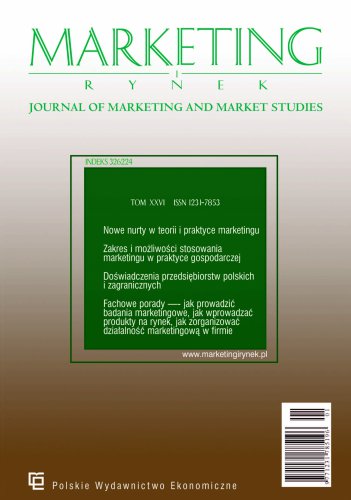The state of entrepreneurship in Poland: an empirical analysis
The objective of the article is to evaluate the entrepreneurship development of Poland and to compare its performance against neighbouring countries in the same region. Entrepreneurial ecosystem of Poland was described using data from European statistics, Global Competitiveness, Doing Business, Global Entrepreneurship Monitor, and Global Entrepreneurship Index. Moreover, the results were compared to the neighbouring countries in the same region in order to determine strengths and weaknesses of Polish entrepreneurial system and possibilities of enhancing the state position. This paper identifies the vulnerable aspects of Poland's entrepreneurship performance through a wide spectrum of sources that finally help to combine many variables in a single model. Prepared analysis helps to detect which entrepreneurial components should be addressed.
Poland's entrepreneurial performance is relatively sufficient compared to some countries in the same region. Poland's entrepreneurial profile strengths are the imperceptible disproportion between women and men in entrepreneurship, with main weakness being lowering TEA (total early entrepreneurial activity) indicators in total and that TEA-type activities are rarely carried out by people aged 55–64 and 18–24. Poland should focus on intensifying activities towards streamlining of the administration serving entrepreneurs, procedural requirements and application execution time, promotion of entrepreneurship and entrepreneurship education and on long-term building of entrepreneurial attitudes, aspirations and skills.The main limitation of the research is that the analysis uses only international reports and statistics, without considering national studies and other partial studies.
References
References/Bibliografia
Ács, Z. J., Szerb, L., Lafuente, E. & Márkus, G. (2019). Global Entrepreneurship Index. The Global Entrepreneurship and Development Institute.Washington, D.C. https://doi.org/10.1007/978-3-030-03279-1
Acs, Z. J. i Audretsch, D. B. (2005). Entrepreneurship, Innovation and Technological Change. Foundations and Trends in Entrepreneurship, 1(4), 149-195. https://doi.org/10.1561/0300000004
Arshed, N., Rauf, R. & Bukhari, S. (2021). Empirical Contribution of Human Capital in Entrepreneurship. Global Business Review, 1-23. https://doi.org/10.1177/0972150920976702
Audretsch, D. (2004). Sustaining innovation and growth: Public policy support for entrepreneurship. Industry & Innovation 11(3), 167-191. https://doi.org/10.1080/1366271042000265366
Busenitz, L. W., West III, G. P., Shepherd, D., Nelson, T., Chandler, G. N. & Zacharakis, A. (2003). Entrepreneurship Research in Emergence: Past Trends and Future Directions. Journal of Management, 29(3) 303, 285-308. https://doi.org/10.1016/S0149-2063_03_00013-8
Category: ENTITIES OF THE NATIONAL ECONOMY, OWNERSHIP AND STRUCTURAL TRANSFORMATIONS (K25), Group: STRUCTURAL BUSINESS STATISTICS (G437). https://bdl.stat.gov.pl/BDL/dane/ (24.09.2021).
Category: Regional Accounts, Group: Gross domestic product (current prices) — PKD 2007 (NACE REV. 2) — ESA 2010 — NUTS 2, Subgroup: Gross domestic product total. https://bdl.stat.gov.pl/BDL/dane/ (24.09.2021).
Economic forecast for Poland. https://ec.europa.eu/info/business-economy-euro/economic-performance-and-forecasts/economic-performancecountry/
poland/economic-forecast-poland_en (24.09.2021).
European Commission (2018). SBA Fact Sheet Czech Republic.
European Commission. Entrepreneurship indicator programme. https://ec.europa.eu/eurostat/web/structural-business-statistics/entrepreneurship, (24.09.2021).
Gartner, W. (1989). Who is an Entrepreneurs? Is the Wrong Question. American Journal of Small Business, January, 11-32. https://doi.org/10.1177/104225878901300406
GEI 2006–2016 Dataset. https://thegedi.org/datasets/ (24.09.2021).
Global Entrepreneurship Monitor 2019/2020 Global Report. Global Entrepreneurship Research Association. London Business School.
Godziszewski, B., Haffer, M., Stankiewicz, M. J. & Sudoł, S. (2011). Przedsiębiorstwo. Teoria i praktyka zarządzania. Warszawa: PWE.
Grabowska, M., Krzywda, J. & Łęgowik-Świącik, S. (2018). Selected Aspects of Entrepreneurship in Poland and Austria. Series: Organization and Management, Scientific Papers of Silesian University of Technology, 116, 37-50. https://doi.org/10.29119/1641–3466.2018.116.3
Grant, K. A., Aziz, O. & Arshed, N. (2019). The impact of entrepreneurial activity of poverty alleviation. Presented in 39th international scientific conference on Economic and Social Development — Sustainability from an Economic and Social perspective, April 29-30, Lisbon. http://www.esdconference. com/upload/book_of_proceedings/Book_of_Proceedings_esdLisbon2019_Online.pdf (13.08.2021).
Hebert, R. F. & Link, A. N. (1989). In Search of the Meaning of Entrepreneurship. Small Business Economics, March, 39-49. https://doi.org/10.1007/BF00389915
Lugo, J. E. B. & Espina, M. I. (2014). Determinant Factors for the Development of Entrepreneurial Activity: A Correlational Study. Esic Market Economics and Business Journal, 45(1), 147-160. https://doi.org/10.7200/esicm.147.0451.4
Matejun, M. (2016), Rozwój kapitału ludzkiego a konkurencyjność firm sektora MSP. Marketing i Rynek, (3), 542-552.
OECD (1998), Fostering entrepreneurship. Paris: OECD.
OECD (2019). The Missing Entrepreneurs 2019. Policies for inclusive entrepreneurship. OECD/European Union.
OECD. Cultivating successful entrepreneurs. https://www.oecd.org/cfe/leed/entrepreneurship.htm (24.09.2021).
OECD. Gross domestic product (GDP). https://data.oecd.org/gdp/gross-domestic-product-gdp.htm, (24.09.2021).
Porter, M. (1990). The competitive advantage of nations. New York: Free Press. https://doi.org/10.1007/978-1-349-11336-1
Praag, C. M. & Versloot, P. H. (2007). What is the value of entrepreneurship? A review of recent research. Small Business Economics, 29(4), 351-382. https://doi.org/10.1007/s11187-007-9074-x
Reynolds, P. D., Bygrave, W. D., Autio, E., Cox, L. W. & Hay, M. (2002). Global Entrepreneurship Monitor, 2002 executive report. Babson College. Kauffman Center for Entrepreneurial Leadership. London Business School.
Schwab, K. (2019). The Global Competitiveness Report 2019. World Economic Forum.
Slovak Business Agency (2020). Report on the State of Small and Medium-sized Enterprises in the Slovak Republic. Bratislava.
Statistisches Bundesamt. Small Sized Enterprises Medium Sized Enterprises. https://www.destatis.de/EN/Themes/Economic-Sectors-Enterprises/Enterprises/Small-Sized-Enterprises-Medium-Sized-Enterprises/_node.html (24.09.2021).
Survey Report: Global Entrepreneurship Monitor Poland 2020. Warsaw.
Winata, S. (2008). The economic determinants of entrepreneurial activity: evidence from a Bayesian approach: a thesis presented in partial fulfilment of the requirements for the degree of Master of Business Studies in Financial Economics at Massey University (Doctoral dissertation, Massey University).
World Bank data. https://data.worldbank.org, (24.09.2021).
World Bank. Historical Data Sets and Trends Data, www.doingbusiness.org, (24.09.2021).

